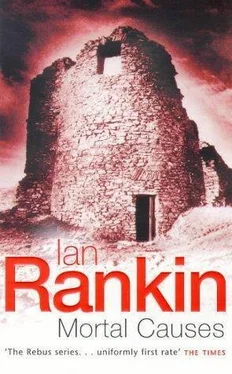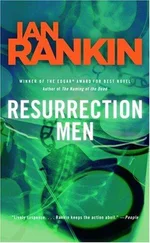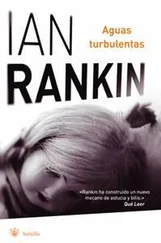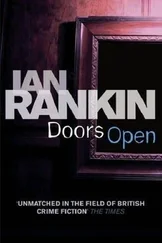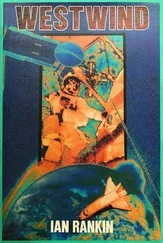'Well, that's interesting in itself. It means we're not dealing with some ancient gang or old flame. SaS was something recent in his life. What about Nemo?’
'It didn't mean anything to her.’
'I've just been talking to Cafferty, SaS meant something to him. Let's pull his records, see if they tell us anything.’
'Now?’
'We can make a start. By the way, remember that card he sent me?’
Clarke nodded. 'What was on it?’
'It was a picture of a pig in its sty.’
'And the message?’
'There wasn't any message,' she said.
On the way back to Patience's he dropped into the video store and rented a couple of movies. It was the only video store nearby that he hadn't turned over at one time or another with vice or Trading Standards, looking for porn and splatter and various bootleg tapes. The owner was a middle-aged fatherly type, happy to tell you that some comedy was particularly good or some adventure film might prove a bit strong for 'the ladies'. He hadn't commented on Rebus's selections: Terminator 2 and All About Eve. But Patience had a comment.
'Great,' she said, meaning the opposite.
'What's wrong?’
'You hate old movies and I hate violence.’
Rebus looked at the Schwarzenegger. 'It's not even an 18. And who says I don't like old films?’
'What's your favourite black and white movie?’
'There are hundreds of them.’
'Name me five. No, three, and don't say I'm not fair.’
He stared at her. They were standing a few feet apart in the living room, Rebus with the videos still in his hands, Patience with her arms folded, her back erect. He knew she could probably smell the whisky on his breath, even keeping his mouth shut and breathing through his nose. It was so quiet, he could hear the cat washing itself somewhere behind the sofa.
'What are we fighting about?’ he asked.
She was ready for this. 'We're fighting about consideration, as usual. To wit, your lack of any.’
'Ben Hur.’
'Colour.’
'Well, that courtroom one then, with James Stewart.’
She nodded. 'And that other one with Orson Welles and the mandolin.’
'It was a zither.’
'Shite,' said John Rebus, throwing down the videos and making for the front door.
Millie Docherty waited until Murdock had been asleep for a good hour. She spent the hour thinking about the questions the police had asked both of them, and thinking further back to good days and bad days in her life. She spoke Murdock's name. His breathing remained regular. Only then did she slip out of bed and walk barefoot to Billy's bedroom door, touching the door with her fingertips. Christ, to think he wasn't there, would never be there again. She tried to control her breathing, fast in, slow out. Otherwise she might hyperventilate. Panic attacks, they called them. For years she'd suffered them not knowing she was not alone. There were lots of people out there like her. Billy had been one of them.
She turned the doorknob and slipper into his room. His mother had been round earlier on, hardly in a state to cope with any of it. There had been a policewoman with her, the same one who'd come to the flat that first time. Billy's mum had looked at his room, but then shook her head.
'I can't do this. Another time.’
'If you like,' Millie had offered, 'I can bag everything up for you. All you'd have to do is have his things collected.’
The policewoman had nodded her gratitude at that. Well, it was the least… She felt the tears coming and sat down on his narrow bed. Funny how a bed so narrow could be made wide enough for two, if the two were close. She did the breathing exercises again. Fast in, slow out, but those words, her instructions to herself, reminded her of other things, other times. Fast in, slow out.
'I've got this self-help book,' Billy had said. 'It's in my room.’
He'd gone to find it for her, and she'd followed him into his room. Such a tidy room. 'Here it is,' he'd said, turning towards her quickly, not realising how close behind him she was.
'What's all this Red Hand stuff?’ she'd asked, looking past him at his walls. He'd waited till her eyes returned to his, then he'd kissed her, tongue rubbing at her teeth till she opened her mouth to him.
'Billy,' she said now, her hands filling themselves with his bedcover. She stayed that way for a few minutes, part of her mind staying alert, listening for sounds from the room she shared with Murdock. Then she moved across the bed to where the Hearts pennant was pinned to the wall. She pushed it aside with a finger.
Underneath, taped flat against the wall, was a computer disk. She'd left it here, half hoping the police would find it when they searched the room. But they'd been hopeless. And watching them search, she'd become suddenly afraid for herself, and had started to hope they wouldn't find it. Now, she got her fingernails under it and unpeeled it, looking at the disk. Well, it was hers now, wasn't it? They might kill her for it, but she could never let it go. It was part of her memory of him. She rubbed her thumb across the label. The streetlight coming through the unwashed window wasn't quite enough for her to read by, but she knew what the label said anyway.
It was just those three letters, SaS.
Dark, dark, dark.
Rebus recalled that line at least. If Patience had asked him to quote from a poem instead of giving her movie titles, he'd have been all right. He was standing at a window of St Leonard's, taking a break from his deskful of work, all the paperwork on Morris Gerald Cafferty.
Dark, dark, dark.
She was trying to civilise him. Not that she'd admit it. What she said instead was that it would be nice if they liked the same things. It would give them things to talk about. So she gave him books of poetry, and played classical music at him, bought them tickets for ballet and modern dance. Rebus had been there before, other times, other women. Asking for something more, for commitment beyond the commitment. He didn't like it. He enjoyed the basic, the feral. Cafferty had once accused him of liking cruelty, of being attracted to it; his natural right as a Celt. And hadn't Rebus accused Peter Cave of the same thing? It was coming back to him, pain on pain, crawling back along his tubes from some place deep within him.
His time in Northern Ireland.
He'd been there early in the history of 'the Troubles', 1969, just as it was all boiling over; so early that he hadn't really known what was going on, what the score was; none of them had, not on any side. The people were pleased to see them at first, Catholic and Protestant, offering food and drink and a genuine welcome. Then later the drinks were laced with weedkiller, and the welcome might be leading you into a 'honey trap'. The crunching in the sponge cake might only be hard seeds from the raspberry jam. Then again, it might be powdered glass.
Bottles flying through the dark, lit by an arc of flame. Petrol spinning and dripping from the rag wick. And when it fell on a littered road, it spread in an instant pool of hate. Nothing personal about it, it was just for a cause, a troubled cause, that was all.
And later still it was to defend the rackets which had grown up around that aged cause. The protection schemes, black taxis, gun-running, all the businesses which had spread so very far away from the ideal, creating their own pool.
He'd seen bullet wounds and shrapnel blasts and gashes left by hurled bricks, he'd tasted mortality and the flaws in both his character and his body. When not on duty, they used to hang around the barracks, knocking back whisky and playing cards. Maybe that was why whisky reminded him he was still alive, where other drinks couldn't.
There was shame too: a retaliatory strike against a drinking club which had gotten out of hand. He'd done nothing to stop it. He'd swung his baton and even his SLR with the rest of them. Yet in the middle of the commotion, the sound of a rifle being cocked was enough to bring silence and stillness…
Читать дальше
